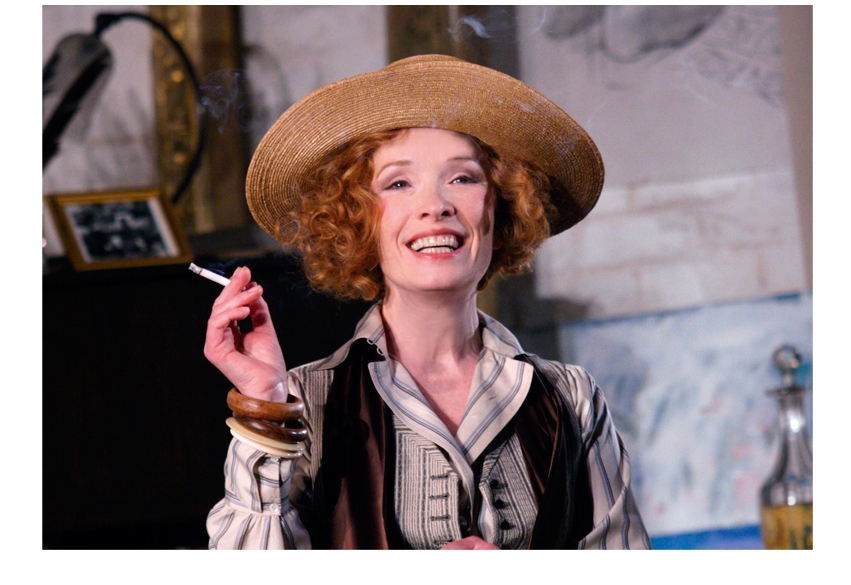Strange sort of classic, Hay Fever. Written when Noël Coward was an unknown actor, it won him no converts among producers. He couldn’t get anyone to stage it. The title is weak and vague. The script lacks incident and action. And the humour is more subtle than audiences were used to. Only after Coward had broken through with his auntie-blasting Oedipal shocker, The Vortex, could he find managers ready to take a second look at his back catalogue.
Hay Fever introduces us to a family of maddeningly self-indulgent Bohemians, the Blisses, whose home is swamped by a quartet of weekend guests. A gruesome house party follows. All the wrong people flirt with each other. A few hasty kisses and some overfrantic proposals ensue. Then everyone leaves and the Blisses carry on as before. That’s all that happens.
Howard Davies’s revival features a stunning and unconventional design by Bunny Christie. Dramatic V-shaped windows throw brilliant sunlight over a painter’s studio, where stacks of unused picture frames lean against a whitewashed wall. A rickety staircase with no bannister leads up to a carpetless balcony. The house’s main entrance looks suspiciously like the double doors of a garage. This fabulous array of dishevelled elegance is, I’m afraid to say, completely wrong. The setting is a drawing room in Cookham, not an artist’s lock-up in Stoke Newington. The Blisses live in the Home Counties for a reason. They belong there. Beneath all the drama-queen bluster and the look-at-me histrionics, they’re a perfectly conventional and rather correct family, so to portray them as a gang of hippie dropouts is to misconstrue part of the play’s psychology.
Never mind. Howard Davies’s zinging revival has plenty of warmth and style thanks to a cast who know just how to capture the crisp frivolity of the text and its undertow of sadness. Lindsay Duncan lays on the full mad swirl of Judith Bliss’s infuriating contradictions. ‘Pass me another of those disgusting cigarettes,’ she orders her doting son. She has to be aggressive, shy, vain, manipulative and utterly charming all at once. Quite a feat. Duncan manages it brilliantly. Freddie Fox plays Simon in a scruffy sleeveless shirt, so he’s more a disused rock star than a Bright Young Thing but his coltish eagerness is spot-on. Jeremy Northam has a lot of fun as a morbid diplomat who harbours secret lusts. And there’s great work from Phoebe Waller-Bridge, who erases all her natural poise and beauty and discovers something gauche and unhinged in Sorel. This randy young flapper, we can guess, will end up alone at 50. A spinsterish Sorel! It’s a brilliant piece of prophetic artistry. And very funny, too.
At the Young Vic, Edward Bond’s play about Shakespeare centres on a land deal that the Bard made with an unscrupulous speculator in the last years of his life. The play is a daft old ruse that gives Bond a chance to parade his political theories in the age of tunics and ruffs. The text is horribly lumpen and unlyrical and the characters are all dumb clichés. Every capitalist is a boo-hiss slave-driver and every peasant is a downtrodden martyr. The only exception is Shakespeare himself, who circles the action reluctantly, impartially, and even dully.
In the opening scene a silly old gardener is prattling away while Shakespeare broods on a bench. ‘There’s only two parts of the body that a woman cares about,’ says the gardener. ‘And one of them’s a fist.’ How does the Bard reply? He doesn’t. Not a word. Not a peep. The greatest wordsmith in history and he can’t match a perky bumpkin with a witty rejoinder. It’s sad, really. Bond has choked with fright at the grandeur of his own conception. Unable to make Shakespeare say anything Shakespearean, he makes him say nothing at all.
Patrick Stewart performs the lead with all his magnificent authority, and that special melancholy sweetness of his, yet he’s constantly shafted by the script. In the second act, desperate to raise a titter, Bond introduces a drunken Ben Jonson who effortlessly outclasses Shakespeare in vitality and wit. ‘The Winter’s Tale,’ he asks, ‘what was that about?’ The Bard says nothing, as ever. Bond then writes one of the most humiliating stage directions in the history of theatre. He orders Shakespeare to fall asleep. What a crazy decision. You put a genius on stage and make him do the one thing that wipes out his genius.
Oddly enough, the show is worth a visit from anyone interested in assessing Bond’s talent. You won’t see a better version of this play and if it fails to make any impression then you’ll be unmoved by the rest of the oeuvre. My view is that Bond would be overrated if he wasn’t performed at all. Pretty soon he won’t be.







Comments